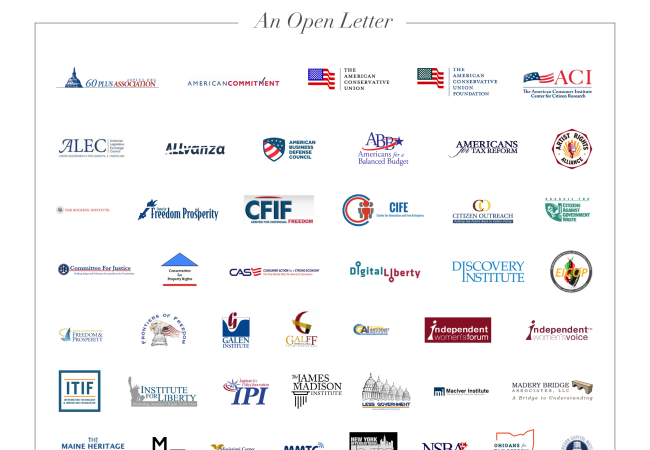INTELLECTUAL PROPERTY GUIDELINES FOR THE 116TH CONGRESS
Property Rights Alliance, Americans for Tax Reform, and Digital Liberty, along with more than 60 bi-partisan state and national organizations have co-authored an open coalition letter to members of the 116th Congress with guidelines for intellectual property rights.
The organizations represent millions of Americans through both state and national advocacy and conduct rigorous research on intellectual property rights while educating the general public on the benefits of intellectual property to the prosperity and wellbeing of society.
The letter pointedly describes the foundation for intellectual property rights in the United States.
The Founding Fathers recognized the importance of IP in Article 1, Section 8 of the Constitution: “To promote the Progress of Science and useful Arts, by securing for limited times to Authors and Inventors the exclusive Right to their respective Writings and Discoveries.”
This clause, articulated by the founders, is rooted in the notion that the best way to encourage creation and dissemination of new inventions and creative works to the benefit of both the public good and individual liberty is to recognize one’s right to his or her intellectual property.
The following guidelines are just a few that the organizations proposed in the letter:
Intellectual Property Rights Must Be Protected Internationally Through Effective IP Provisions in Trade Agreements
Far too many foreign governments look the other way when it comes to the theft of IP. State-sanctioned IP theft from other countries costs the U.S. economy more than $320 billion annually.
By harmonizing and strengthening IP standards, Congress and the Administration incentivize creativity, innovation and investment here at home. Moreover, strong IP provisions in trade agreements allow local innovative and creative industries to flourish. Therefore, strong IP protections are integral to all trade agreement negotiations.
And:
Intellectual Property Rights Are Integral to Consumer Protection and National Security
IP rights protect consumers by enabling them to make educated choices about the safety, reliability, and effectiveness of their purchases. In 2017, consumer electronics and parts represented 12 percent of total counterfeit goods seized, presenting a dangerous risk to American consumers if those products malfunction.
Illegal intangible goods are also dangerous. One-third of websites offering stolen movies and television shows were found to contain malware, putting consumers at risk of identity theft, credit card fraud, and more.
The ease of doing business online has also led to an increase in the number of sites selling illegal products. In 2017, the U.S. coordinated actions with 26 other countries to take down a record 1.21 million domain names and shutdown 2.2 million links to online marketplaces that sold counterfeit and copyright infringing products.
The protection of IP rights is also vital to national security to prevent counterfeit parts, which compromise the reliability of weapons systems and the safety of military personnel, from entering the defense supply chain. A May 21, 2012 Senate Armed Services Committee report revealed 1,800 cases of counterfeiting, involving more than 1 million parts.
Intellectual property protection has historically been a bipartisan concern in America, and the Constitution made it clear from the beginning that these protections are paramount to a strong, healthy, and free economy. That is because inventors need full freedom to speak, create and innovate. While consumers need confidence in the quality and safety of the products and services that they rely on, made possible largely to due to a competitive IP marketplace. The continued diligence in protecting intellectual property rights provides those assurances. The new Congress must take these guidelines into consideration in all of their future deliberations regarding intellectual property.
The full letter can be read here

